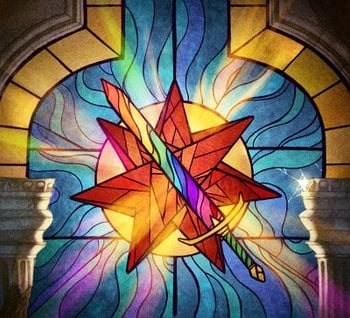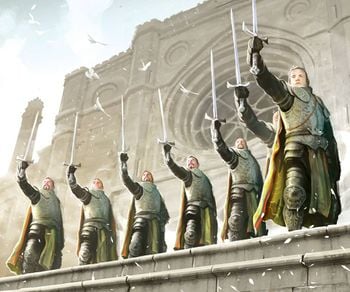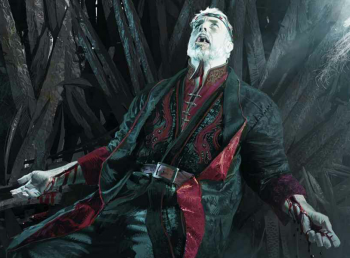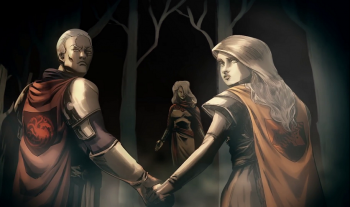Faith Militant uprising
|
| Note: The title of this article is pure conjecture and may be subject to change. |
| Faith Militant uprising | |||||||||||||||||
|---|---|---|---|---|---|---|---|---|---|---|---|---|---|---|---|---|---|
 | |||||||||||||||||
|
| |||||||||||||||||
| Date | 41–48 AC[N 1] | ||||||||||||||||
| Location | Seven Kingdoms | ||||||||||||||||
| Battles |
Burning of the Sept of Remembrance Battle of Stonebridge Battle at the Great Fork Ambush at the Wendwater | ||||||||||||||||
| Result |
Faith Militant disbanded The Faith's traditional right to judge its own was abolished | ||||||||||||||||
| |||||||||||||||||
The Faith Militant uprising was a rebellion by the militant orders of the Faith of the Seven against the rule of House Targaryen over the Seven Kingdoms.[1][2] The uprising began during the reign of King Aenys I Targaryen, continued through the reign of Maegor I Targaryen, and eventually ended during the reign of Jaehaerys I Targaryen.
Contents
Prelude
Although the uprising began during the reign of King Aenys I Targaryen, the first seeds were already planted during the reign of his father, King Aegon I Targaryen. Before the birth of Aenys's children, his younger half-brother Maegor was regarded as his heir. However, Aenys was wed in 22 AC, and his first child, Princess Rhaena, was born the next year. Her birth sparked the discussion of the line of succession, as it was unclear whether Maegor remained second in the line of succession or whether he fell behind the newborn Rhaena. In 24 AC, shortly after Maegor turned twelve, his mother Queen Visenya Targaryen proposed a betrothal between Rhaena and Maegor to settle the issue of the royal succession. However, both Prince Aenys and his wife and the High Septon protested.[3] The High Septon suggested his own niece, Lady Ceryse Hightower, as a bride for the young prince instead. Maegor and Ceryse were subsequently wed in 25 AC at the Starry Sept in Oldtown, in a ceremony officiated by the High Septon himself.[4][5]
After fourteen years of childless marriage, Maegor suddenly announced in 39 AC that Ceryse was barren and that he had taken another wife, Lady Alys Harroway, the daughter of the new Lord of Harrenhal, Lucas Harroway. Unable to convince the septon at Dragonstone to perform the wedding, Maegor had taken Alys to wife in a Valyrian wedding ceremony led by the Dowager Queen, Visenya.
Maegor's second marriage angered many. Ceryse's father, Lord Martyn Hightower, protested the marriage to King Aenys and demanded that Maegor set Alys aside. The High Septon denounced the marriage as sin and fornication and called Alys "this whore of Harroway." Many of the pious lords in the realm similarly condemned the marriage, and openly began to call Alys "Maegor's Whore". Maegor remained defiant, however, citing that his father had taken two wives as well, claiming that the strictures of the Faith did not rule the blood of the dragon.[5]
Maegor quarreled bitterly with his brother over the marriage, as the king had neither known of the marriage prior to the ceremony, nor given his leave for it. Eventually, Aenys made Maegor choose between setting Alys aside or going into exile for five years. Maegor chose the latter, and left for Pentos in 40 AC.[3] The High Septon was not yet satisfied, however, so Aenys appointed Septon Murmison as his new Hand of the King, but even he could not heal the rift between the Iron Throne and the Faith.[3]
The situation worsened in 41 AC, when Aenys wed his daughter Rhaena and son Aegon to one another. The High Septon sent Aenys a denunciation, addressing him as "King Abomination". The uprising was about to begin, and even the pious lords and smallfolk, who had loved Aenys turned against the king.[3]
Uprising
Early conflicts
Conflicts began in King's Landing. For having performed the wedding ceremony, Septon Murmison was expelled from the Faith. A fortnight later, he was cut to pieces by Poor Fellows who had taken up arms. And other Poor Fellows scaled the walls of the Red Keep, attempting to murder the king and his family, failing only when a knight of the Kingsguard[N 2] intervened. The Warrior's Sons began to fortify the Hill of Rhaenys, ensuring the Sept of Remembrance could withstand the Targaryens.[3][6]
Aenys and his family fled the city and went to Dragonstone. Aenys refused to follow Visenya's advice to burn the Starry Sept at Oldtown and the Sept of Remembrance in King's Landing. Meanwhile, thousands of Poor Fellows threatened the king's supporters and dozens of lords gave their support to the Faith. By the end of the year, most of the realm had joined the side of the Faith. Aenys, unable to decide how to deal with the rebellion, fell ill. He collapsed when he learned that Rhaena and Aegon were besieged at Crakehall, and died three days later.[3]
Maegor the Cruel

Visenya flew on Vhagar to Pentos after Aenys's funeral in order to retrieve Maegor from exile. Maegor was crowned upon his return to Dragonstone, and executed Grand Maester Gawen for protesting his claim to the throne. Maegor then flew upon Balerion to King's Landing, where the militant orders of the Faith had seized the Sept of Remembrance on Rhaenys's Hill and the half-completed Red Keep. On Visenya's Hill, Maegor raised the banner of House Targaryen and gathered the support of thousands.[4]
Dowager Queen Visenya challenged those who questioned Maegor's right to rule to prove themselves. The challenge was met by Ser Damon Morrigen, the Grand Captain of the Warrior's Sons. Maegor quickly decided to settle the matter with swords, and Damon demanded a trial of seven, to which Maegor agreed.[4] Though Maegor was the only survivor out of fourteen combatants, he took a blow to the head and collapsed just as the last Warrior's Son died.[5]
On the twenty-eighth day of Maegor's coma, Queen Alys Harroway returned from Pentos, bringing with her Tyanna of the Tower, a courtesan who had become Maegor's lover during his exile. Tyanna took over his care, and Maegor woke from his coma on the thirtieth day. Maegor mounted Balerion and without warning flew over Rhaenys's Hill, unleashing the Black Dread's dragonflame during the burning of the Sept of Remembrance. Those who tried to flee from the flames were slain by archers Maegor had placed around the hill. The screams of burning and dying men were said to echo in the streets of King's Landing, and it was claimed a pall hung over the city for seven days.[4]
That same year a battle at Stonebridge was fought between Maegor's forces and the Poor Fellows. The Poor Fellows were nine thousand strong, under the command of Wat the Hewer. While crossing the Mander, they were caught between six lordly armies supporting Maegor. With the army of Poor Fellows divided by the river, they were cut to pieces. The sheer brutality of the carnage made the Mander run red with blood for twenty leagues, resulting in the bridge and castle that commanded it forever after being known as Bitterbridge.[4] Wat the Hewer managed to kill half a dozen lords, including Lord Meadows, the commander of the king's army, but was taken alive himself and delivered to King's Landing in chains.[5] Thirteen thousand Poor Fellows, two hundred knights of the Warrior's Sons from Stoney Sept, and a dozen rebel lords from the riverlands and westerlands then fought against Maegor's forces in a great battle at the Great Fork of the Blackwater Rush. This resulted in a decisive victory for Maegor, whose dragon left death in its wake.[4][5]

Following these two victories, Maegor announced his intent to take a third wife by wedding Tyanna of the Tower. Grand Maester Myros spoke against the proposed wedding, stating that Maegor's "one true wife", Ceryse Hightower, awaited him at the Hightower. Maegor heard him out in silence before beheading Myros with Blackfyre. Maegor and Tyanna were wed on Rhaenys's Hill, surrounded by the remains of the Warrior's Sons who had died at the Sept of Remembrance. At Oldtown, however, the High Septon loudly denounced "the abomination and his whores", while Ceryse continued to insist that she was Maegor's only lawful queen.[5]
As the Faith continued to resist his rule, Maegor raised a set of laws which forbade holy men from carrying arms,[7][8] and punished lords who spoke out against the suppression of the Faith.[9] In response, the High Septon commanded Maegor to present himself in Oldtown and beg the forgiveness of the gods for his sins and cruelties. While Maegor remained focused on the Red Keep's construction, the "pious lords" continued their resistance for half a year, until Visenya mounted her dragon, Vhagar, and burned the seats of Houses Blanetree, Terrick, Deddings, Lychester, and Wayne in the riverlands within a single night. Maegor flew Balerion to the westerlands, burning the seats of Houses Broome, Falwell, Lorch, and other "pious lords" who had defied his royal summons.[5]
Next,[N 3] Maegor and Visenya turned towards Oldtown, threatening to incinerate the Starry Sept in response to the High Septon's condemnation of his polygamous marriages. Shortly after, the High Septon died suddenly, allowing Lord Martyn Hightower to open his gates before Balerion and Vhagar could burn the city.[10] Rumors about the nature of the High Septon's death still persist today. As he had been in good health, some have suggested that he had committed suicide, either to save himself from Maegor's wroth or to spare Oldtown from the dragonfire. Others believe that the gods themselves had struck him down. Most believe he had been murdered, although opinions differ about the murderer's identity. Ser Morgan Hightower, the commander of the Warrior's Sons in Oldtown, who was the only Warrior's Son pardoned by King Maegor, has been suggested as the murderer. Others have suggested Lady Patrice Hightower, the aunt of Lord Martyn and Ser Morgan. The archmaesters of the Citadel have been suggested to have played a role in the High Septon's death, and Dowager Queen Visenya, a rumored sorceress, has also been named.[10][5]
Septon Pater was elected as the new High Septon that same night. A more passive man, he anointed Maegor upon his arrival at the Starry Sept and did not lift a finger as the Warrior's Sons at Oldtown were either sent to the Wall or executed. Maegor remained at Oldtown for half a year, presiding over the trials personally.[5] Adding to his earlier laws, Maegor now placed bounties on the heads of the faithful who remained defiant: a gold dragon was given for the scalp of a Warrior's Son and a silver stag for the scalp of a Poor Fellow.[2][5]

The new High Septon too proved unable to halt the rebellion.[4] Although he attempted to disband the Stars and Swords, he made little effort to reduce the constant violence. When the High Septon once called Pater died in 44 AC, another was raised up in his place. This new High Septon spoke no word against the king or his queens, and became known as the "High Lickspittle". Thousands of Poor Fellows still remained, roaming the woods and hedges of the Seven Kingdom. One band crowned their own High Septon, in the person of a bearded brute named Septon Moon. The few Warrior's Sons still around were led by Ser Joffrey Doggett, the Red Dog of the Hills. Because they had been outlawed and condemned, they did not have the strength to meet the king's forces in open battle. Disguised as hedge knights, however, they hunted and slew Targaryen loyalists and those whom they considered traitors to the Faith.[5]
Maegor temporarily pulled back from the war, focusing instead on the completion of the Red Keep, but in late 45 AC he began a new campaign against the Faith. Maegor hunted down the Poor Fellows who had taken refuge in the kingswood south of the Blackwater Rush. Although Poor Fellows and peasants attempted to prevent the burning of Jeyne Poore, Maegor had all the would-be rescuers, including Ser Horys Hill, slaughtered in an ambush at the Wendwater.[5] In 46 AC, Maegor brought two thousand skulls from his campaign against the Faith to King's Landing, claiming they were the heads of Warrior's Sons and Poor Fellows. Many suspected they were the skulls of innocent smallfolk, however.[4]
Despite Maegor's success in the kingswood, Septon Moon roamed the riverlands and the Reach, Joffrey Doggett controlled the hills north of the Golden Tooth, and Dennis the Lame and Ragged Silas were still at large. Joffrey gained the support of House Tully of Riverrun and in 48 AC once again led the Poor Fellows against Maegor.[5] Maegor's master of coin, Lord Alton Butterwell,[5] raised taxes to support Maegor's expensive campaigns, which angered lords.[11] As more and more of the realm began to oppose Maegor, the support he received diminished.[4]
Conclusion
Maegor's death

Maegor had been battling not only the Faith during his reign, but also his own family. Aenys I Targaryen's widow, Dowager Queen Alyssa Velaryon, and her two youngest children, Jaehaerys and Alysanne, had been made hostages on Dragonstone, while Prince Viserys had been made Maegor's squire in King's Landing. Aenys's eldest son, Prince Aegon, challenged Maegor's claim to the throne, but died in the Battle Beneath the Gods Eye in 43 AC.[4]
Aegon's sister-wife, Rhaena, and their two young daughters, Aerea and Rhaella, evaded capture for a while, being protected by Lord Farman on Fair Isle, until they were found by Tyanna of the Tower, upon which Rhaena was forced to marry Maegor. Following the death of Dowager Queen Visenya in 44 AC, Alyssa escaped with Jaehaerys and Alysanne. Maegor had Prince Viserys killed, hoping he could force Alyssa to come to King's Landing to claim her son's body. Instead, Alyssa's youngest son, Jaehaerys, put forward his claim for the throne, and although Maegor disinherited him, naming Rhaena's daughter Aerea as his heir instead, support for Jaehaerys grew.[4]
Lord Daemon Velaryon, the admiral of the king's fleets, eventually turned against Maegor, and gave his support to Jaehaerys. His example was followed by many of the great houses. Jaehaerys named Rogar Baratheon, Lord of Storm's End, as Protector of the Realm and Hand of the King. Rhaena fled from Maegor on her dragon, Dreamfyre, when she learned of Jaehaerys's proclamation, stealing Maegor's Valyrian steel sword, Blackfyre. Ser Olyver Bracken and Ser Raymund Mallery of the Kingsguard abandoned Maegor as well, joining Prince Jaehaerys instead. Facing so much opposition with only the forces of a few lord from the crownlands at his disposal, Maegor's situation was dire. In 48 AC, he was found dead upon the Iron Throne. The manner of his death is still speculated about today.[4]
Jaehaerys the Conciliator
Prince Jaehaerys ascended the throne in 48 AC following Maegor's death. He was crowned by the High Septon. About a decade into his reign, he became acquainted with Septon Barth, who tended to the books and records in the Red Keep's library. Jaehaerys soon named him Hand of the King, a position he kept for forty years.[8][12] Together with Barth, Jaehaerys re-conciliated the Iron Throne with the Faith. The Poor Fellows and Warrior's Sons, much reduced in number, were still present and restless, eager to restore their orders. Jaehaerys sent Septon Barth to Oldtown to speak with the High Septon. It was agreed that the Iron Throne would always protect and defend the Faith, if the last few Stars and Swords would put down their weapons, and if the Faith agreed to accept justice from the Iron Throne instead of the Faith.[8] The Faith accepted Targaryen marriage practices in the Doctrine of Exceptionalism.[13]
Two years after Jaehaerys ascended the throne, members of the Faith Militant and Maegor's loyalists who had been exiled to the Wall made common cause in a rebellion against the leadership of the Night's Watch to try to establish their own lordships, requiring the intervention of Lord Walton Stark to crush the traitors.[14]
Notes
- ↑ Official peace was agreed upon during the reign of Jaehaerys I Targaryen (48 AC - 103 AC). Jaehaerys named Septon Barth as his Hand of the King about a decade into his reign. Barth would hold this position for forty years, during which time he aided the king in creating the peace (The World of Ice & Fire, The Targaryen Kings: Jaehaerys I, and A Storm of Swords, Davos V)
- ↑ Ser Raymont Baratheon, according to The World of Ice & Fire. In Fire & Blood the knight is unnamed.
- ↑ Earlier prints of The World of Ice & Fire erroneously state that this event and the death of the High Septon took place in 44 AC (The World of Ice & Fire, The Reach: Oldtown). The Sons of the Dragon gives the correct date of 43 AC. The High Septon elected as a replacement, dies a year later.
References
- ↑ A Feast for Crows, Chapter 11, The Kraken's Daughter.
- ↑ 2.0 2.1 A Feast for Crows, Chapter 33, Jaime V.
- ↑ 3.0 3.1 3.2 3.3 3.4 3.5 The World of Ice & Fire, The Targaryen Kings: Aenys I.
- ↑ 4.00 4.01 4.02 4.03 4.04 4.05 4.06 4.07 4.08 4.09 4.10 4.11 The World of Ice & Fire, The Targaryen Kings: Maegor I.
- ↑ 5.00 5.01 5.02 5.03 5.04 5.05 5.06 5.07 5.08 5.09 5.10 5.11 5.12 5.13 Fire & Blood, The Sons of the Dragon.
- ↑ The World of Ice & Fire, The Stormlands: House Baratheon.
- ↑ A Feast for Crows, Chapter 43, Cersei X.
- ↑ 8.0 8.1 8.2 The World of Ice & Fire, The Targaryen Kings: Jaehaerys I.
- ↑ The Sworn Sword.
- ↑ 10.0 10.1 The World of Ice & Fire, The Reach: Oldtown.
- ↑ Fire & Blood, A Surfeit of Rulers.
- ↑ A Storm of Swords, Chapter 54, Davos V.
- ↑ Fire & Blood, A Time of Testing - The Realm Remade.
- ↑ Fire & Blood, Jaehaerys and Alysanne - Their Triumphs and Tragedies.
| ||||||||
- Articles with conjectural titles
- Wars
- Westeros
- Faith Militant
- Faith Militant uprising
- Faith of the Seven
- House Bar Emmon wars
- House Blanetree wars
- House Broom wars
- House Buckwell wars
- House Byrch wars
- House Bywater wars
- House Darklyn wars
- House Deddings wars
- House Doggett wars
- House Falwell wars
- House Harte wars
- House Hayford wars
- House Hightower wars
- House Hogg wars
- House Lorch wars
- House Lychester wars
- House Mallery wars
- House Massey wars
- House Meadows wars
- House Mooton wars
- House Morrigen wars
- House Myatt wars
- House Oakheart wars
- House Rollingford wars
- House Rosby wars
- House Rowan wars
- House Smallwood wars
- House Staunton wars
- House Stokeworth wars
- House Targaryen wars
- House Terrick wars
- House Towers wars
- House Velaryon wars
- House Wayn wars
